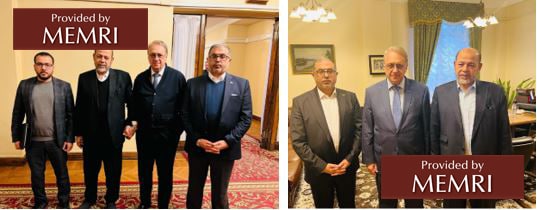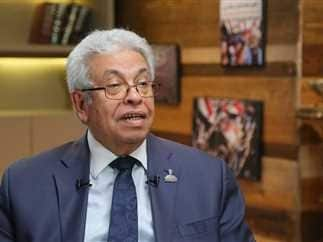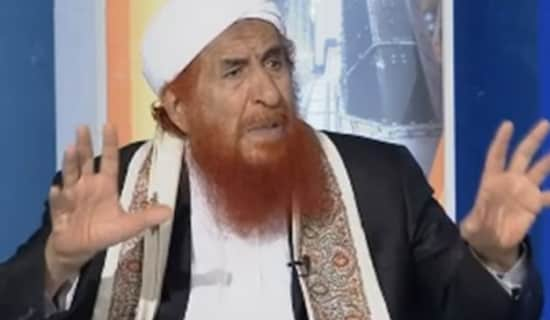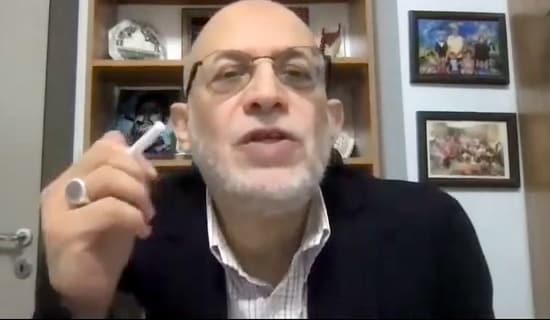According to a February 10, 2024 report in the online daily Rai Al-Youm, owned by Palestinian journalist Abd Al-Bari Atwan, Russia has recently conveyed its support to Hamas and the other Palestinian resistance factions, and pledged to place its UN Security Council veto power at Hamas’ disposal and to aid it in various ways, excluding the provision of weapons. The report states further that Russian officials expressed gratitude to the Hamas leadership for causing the U.S. and the West to shift their attention from the war in Ukraine to the war in Gaza.
Some of these messages may have been relayed to the Hamas leadership through a Hamas delegation, headed by the movement’s international relations chief Moussa Abu Marzouq, that visited Moscow on January 19, 2024. The delegation, which also included Hamas Political Bureau member Bassem Na’im and the Hamas representative in Moscow, met with Russian Deputy Foreign Minister and Putin’s Special Representative to the Middle East and Africa, Mikhail Bogdanov. According to a report published by Hamas, the delegation “held political consultations with the Russian foreign ministry about ways to [achieve] a ceasefire” in Gaza and “in order to clarify the movement’s position and policy” regarding the Israeli hostages it is holding. The report adds that the delegation “stressed the Palestinian people’s right to achieve freedom and return, and its right to oppose the Zionist occupation by every possible means.” Bogdanov, for his part, “expressed his country’s support for the Palestinian people’s rights and described the efforts it is making vis-à-vis the relevant elements to promote a ceasefire” in Gaza.[1]
It should be noted that this is the Hamas delegation’s second visit to Russia since the October 7, 2023 Hamas terrorist attack. The same delegation visited Russia on October 26, 2023, less than three weeks after the attack.[2] These visits are a direct continuation of Russia’s ongoing relations with Hamas in recent years, which included multiple visits to Russia by Hamas leaders who stressed the movement’s “right” to “oppose the Israeli occupation by every means,” i.e., to carry out terrorist attacks, and also expressed support for Russia’s foreign policy.[3]

Left: Hamas delegation members with Russian Deputy Foreign Minister Mikhail Bogdanov during January 2024 Moscow visit; right: Hamas delegation members with Bogdanov during October 2023 Moscow visit (Images: T.me/hamasps, January 19, 2024; October 26, 2023)
Against this backdrop, former Hamas official Mustafa Al-Lidawi disclosed in an article that, in the months since the outbreak of the Gaza war, Russian President Putin has conveyed messages of support and praise for Hamas and even expressed his “admiration for the operations of the Palestinian resistance.” Lidawi called on Putin to complement this praise with practical and serious, rather than theoretical, positions.
This report presents the Rai Al-Youm report on Russia’s messages to Hamas, and translated excerpts from Al-Lidawi’s article.
Rai Al-Youm: Russia Clarified To Hamas That It's On Its Side And Ready To Assist It In Additional Ways, Excluding The Provision Of Weapons
As stated, on February 10, 2024, Rai Al-Youm reported on messages of support conveyed by Russia to the Hamas leadership. The report states that Russia’s consultations and coordination with the leaders of the Palestinian resistance factions indicate that this country does not care how Israel and the U.S. classify these factions, and adds: "The Hamas political leadership recently received a message from Russian diplomatic corridors, conveying that 'we are on your side and will back you in the Security Council.' Senior Hamas official Dr. Moussa Abu Marzouq heard this from prominent figures in the [Russian] foreign ministry and defense ministry when he visited Moscow. [Hamas leader] Ismail Haniya also heard this, from the veteran and leading Russian diplomat [Mikhail] Bogdanov."
The report states further: “In Moscow, a general in the defense ministry asked Abu Marzouq directly, 'How [can we] serve you? What can we supply you with, other than weapons?' From the context, it was possible to understand that Moscow wants to exhibit more openness toward the Palestinian resistance, but does not want to cross too many red lines, because the right wing in Israel, which currently controls [this country], 'is very sensitive' and 'it is likely to turn more firmly against [Russia] in Ukraine,' as a senior Russian official remarked to a senior Palestinian official. Abu Marzouq, with his incisive wisdom, expressed gratitude for 'the Russian initiatives' and noted that the Palestinian resistance is grateful for Russia's political support and 'anticipates more.' Regarding weapons, [the Russians] were told that the Hamas movement is content with the backing that Russia provides to [Hamas’] partner, the Lebanese resistance [i.e. Hizbullah]."
SUPPORT OUR WORK

The Russians Thanked Hamas And The Other Palestinian Factions For Causing The U.S. Planes To Leave Ukraine For The Gaza Strip
Noting that "the openness towards Moscow is 'a real and substantive achievement' according to the criteria of Abu Marzouq and the rest of Hamas’ diplomatic team," the report goes on to state that "Moscow recently added the [Palestinian] Islamic Jihad [PIJ] to its contact and consultation array. Even before this, in a meeting in Doha, the Russians told the Hamas leadership that they appreciated the role of the resistance factions in engaging some 5,000 Western and American planes that had [previously] spied on Russia and its operations in Ukraine but have now been redeployed to the Gaza Strip."
Russia Promised Hamas Leaders To Place Its UNSC Veto Power At Their Disposal; Warned Them Arab Countries Are Plotting Against Them
The report adds that, "behind the scenes, the Russians made a commitment to the Palestinian resistance: ‘our veto [power] at the Security Council will be at your disposal.’ This is a direct commitment by Moscow that the Russian veto will oppose any American or Western proposal aimed at holding the Palestinian people responsible. The impression in the resistance circles to date is that Moscow has fulfilled this commitment and used the veto [power] at least three times 'to protect the resistance and the people of Gaza' from dangerous draft resolutions.”
The article concludes by quoting Russian diplomats as saying that "the Americans deliberately eliminated the International Quartet in order to deprive Russia of its role in the regional peace process," and that "a prominent Russian military official warned representatives of the Palestinian resistance that 'some Arab countries are plotting against you' and constitute a significant element 'in support of the Israeli aggression.'"[4]
Former Hamas Official: Putin Is Grateful To Hamas For Drawing America Away From Ukraine; He Should Reward Hamas For This
In a January 2, 2024 article, Palestinian writer and researcher Dr. Mustafa Lidawi, formerly Hamas’ representative in Syria, Lebanon and Iran, wrote that the war in Gaza caused the U.S. and the West to shift their attention from Ukraine to the Gaza Strip, and that Russian President Vladimir Putin used this to increase his attacks on Ukraine and attain significant achievements on the battlefield. He added that Putin should reward Hamas for providing him with this opportunity, and stressed that the Palestinians will not suffice with the messages of gratitude and appreciation that Putin has already conveyed to Hamas through mediators, but expect more tangible assistance.
Lidawi wrote: “[Russia] may be the one that benefits the most from the war against Gaza. It took advantage of America’s and the European countries’ preoccupation with Israel’s cruel aggression against Gaza to boost its forces in Ukraine and direct all its military power against it… It [also] increased its precise attacks on hundreds of sensitive facilities and strategic targets, whose destruction influences the course of the war and weakens the Ukrainian home front, and [Russia] achieved in the last three months what it had not managed to achieve in a whole year of military action.
“Russian President Vladimir Putin used the new international circumstances to take serious and quiet action on the various fronts in Ukraine: the deep ones, the far ones and those near the Russian borders, taking fierce revenge on the Ukrainian leadership… He understood that the American and Western strategic supply lines [to Ukraine] had been severed, the weapons shipments had stopped, along with the support and assistance campaigns, that the media war against his country was waning and that the Ukrainian leadership had grown weaker in the conflict and was unable to defend [its] territory… He took advantage of this situation to attack, occupy, bomb, destroy and achieve many [goals] he had dreamed of and hoped for…
“The Palestinians, for their part, understand that they are the ones who provided the Russian president and his country with this golden opportunity to achieve his goals. [They understand] that, if the U.S. and Europe had not been preoccupied with the war in Gaza and had not turned to support, aid and defend the Zionist regime, [Putin] would not have been able to recover what he had lost… and regain his deterrence and advantage. The U.S. and its allies would have probably continued to exhaust Russia, crush it, destroy its economy and isolate it...
“In return, the Palestinians expect the Russian leadership to acknowledge the favor and reward them with an equal or greater favor: by aiding and supporting them, backing them and assisting them, and thwarting the plots against them and the decisions aimed at harming them and eliminating their cause. But only if [Russia’s] positions are not theoretical, weak, vague and ineffectual, but rather serious and practical [positions] that will frighten and alarm the enemy, and force it to withdraw, halt the war and stop the attacks.
“The Palestinians are probably aware of the gratitude felt by the Russian president towards their resistance [forces, i.e., Hamas], of his praise for [Hamas’] steadfastness, and of his admiration for its operations and for the [Palestinian] people: its patience, steadfastness and willingness to give, and the way it embraces the resistance. The Palestinians know that [Putin] conveyed these positions of his through mediators and allies. But the Palestinians believe that this gratitude is not enough. Theoretical support is useless and is powerless to change reality. It also seems that [Putin’s] admiration and praise are secret, and he is afraid to let them be known, especially by the [Zionist] entity…”[5]
[1] T.me/hamasps, January 19, 2024.
[2] T.me/hamasps, October 26, 2023.
[3] See e.g., MEMRI Special Dispatch No. 10536 - Senior Hamas Official On Hamas Delegation Russia Visit: Russia Is 'One Of The Most Important Supporters' Of Palestinian Rights; The U.S. Seeks Calm In The Middle East So It Can Turn Its Attention To Its Disputes With China And Russia – March 23, 2023; Special Dispatch No. 10217 - Hamas Leaders Visiting Moscow To Russian Officials: We Are Entitled 'To Resist Occupation By Every Possible Means'; 'U.S. Global Hegemony Has Harmed Palestinian Cause' – September 20, 2022.
[4] Raialyoum.com, February 10, 2024.
[5] Elaph.com, January 2, 2024.




